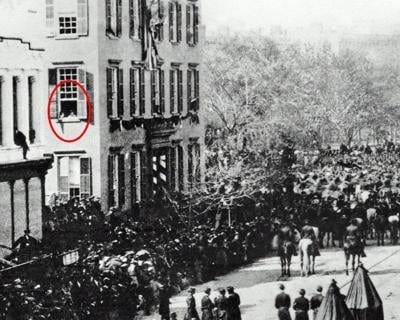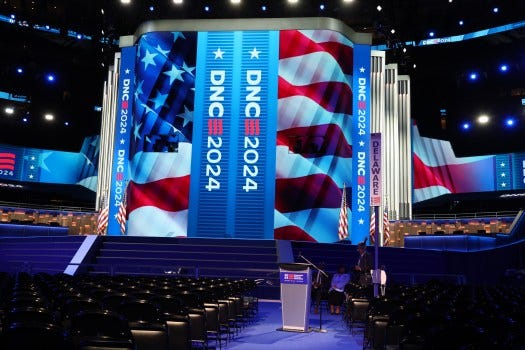Election Essentials - August 18th: 'Kamunists' go up against the 'self-obsessed rich-guys'
And: where Biden being off the ballot might hurt, inflation figures, drugs coup for Biden, AZ abortion, RFK's struggles, Theo in the window, and the DNC
Welcome to the fourth edition of Election Essentials. I’ll be sharing the moments and patterns I’ve seen out there, as well as looking to the week ahead.
Story of the week
This is the week the race found some policies. In the span of seven days, we got:
Kamala Harris adopting Trump’s ‘no taxes on tips’ policy as her own
Trump doubling down on his proposed tax cut on social security
Housebuilding proposals from Harris, including tax incentives to get more new housing starts
Trump boosting his potential flat tariffs on trade (formerly 10%) to “10-20%”
Child tax credit proposals from the Harris campaign
And the one that has got the most attention: federal laws to control price gouging by grocery companies
What impact will all this have? Does policy even matter in U.S. elections any more? The tips policy was important more for what it stops. By copying it, Harris has stymied a stratospherically popular unique selling point for Trump.
The price-gouging announcement had cut-through too, but not for the reasons Harris would have wanted. The New York Post screamed ‘Kamunism’, and Trump went on the attack, describing Harris’ vision as one for a “communist country”.
With voters’ biggest hesitation about Harris being that she is too liberal, this is a powerful attack line. And it isn’t just the usual right-wing suspects. The Washington Post, CNN, and Newsweek all cast doubt on the policy. That buttresses the potency of the Trump attack.
The Harris campaign made a statement earlier in the week writing off Trump and his backers as “self-obsessed rich guys”. But this is a country where getting rich and getting ahead is the epitome of success for most Americans.
I think the most significant moment was a clip that went viral after the speech, where Harris listed the price increases that have taken place since the pandemic (under the Biden-Harris administration). It was rookie politics, will be used by opponents over and over again, and does make me wonder whether the campaign might steer clear of economics for a time.
One thing is for sure: both sides are splashing the cash. An analysis by the Committee for a Responsible Federal Budget found this week that Trump’s promises would add up to $1.6 trillion, Harris’ $1.7 trillion.
Poll of the week
Yes, I’m naming my own poll this week. A J.L. Partners/Daily Mail poll found today that the argument that hurts Harris the most is her support of a bail fund that led to a criminal being released, who ended up committing murder. The Trump campaign might have already figured this out: a separate criminal case linked to Harris’ record was the feature of a new ad by Trump super-PAC MAGA Inc. Expect these attacks to increase.
Stat of the week
In September 1985, 72% said it was a good time to buy a home. That was in the context of mortgage rates higher than today. But look at the number now: in June 2024, just 12% said it was a good time to buy a home.
The WSJ puts it down to a lack of supply: the number of new home starts fell by more than expected this month.
Observation of the week
This tweet from one of the best pollsters in the business, Patrick Ruffini, pointing out that Biden’s heritage and religious background may have buttressed him in the north east and Pennsylvania. It’s easy to forget that Biden was contesting his state of birth in 2020: that advantage won’t be there this time round.
Oped of the week
I thought this by Daniel Henninger of the Wall Street Journal was excellent: ‘Have Trump’s Rallies Become a Political Loser?’.
To win this election, Donald Trump needs to chill. He needs to find a campaign venue whose structure will keep him relatively calm. That’s not a rally, an acceptance speech, a one-on-one with a journalist or a press conference. All are Trump time bombs.
At the risk of sounding delusional, there is an alternative: Mr. Trump should hold town halls with uncommitted voters in Pennsylvania, Wisconsin, Michigan, Nevada, Arizona, Georgia and North Carolina.
Thinking about the interviews with swing voters I have been conducting, Henninger’s points massively ring true.
Historical fact of the week
As Abraham Lincoln’s funeral procession moved through New York in April 1865, a six-year-old Theodore Roosevelt watched on. Remarkably, it was pictured, and someone dug it out decades later.
Two bits of economic news
Inflation went down again to 2.9% this week, further nailing on an already nailed-on interest rate cut in September. The question still remains whether it will be half a point, or a quarter of a point.
Little noticed, but the Biden administration had a major win this week. Using a process they created in the Inflation Reduction Act, they have negotiated down the prices for drugs acquired on Medicare, securing an overall 22% saving. How much that cascades to patients is an open question, but there’s no doubt it is a political win that Harris would do well to make more of.
Two bits of political news
A constitutional amendment to protect abortion was confirmed to be going on the ballot for voters in Arizona this week. It will galvanize Democrat turnout and makes Arizona that little bit trickier for Trump and the Republicans.
RFK Jr has had a tough week. It leaked that he asked Kamala Harris for a Cabinet job, and he got blocked from the New York ballot. Questions are swirling around whether her will make it to November. Our polling still shows the former Democrat hurting Harris more than Trump.
Look ahead
The Democratic National Convention (the DNC) starts in Chicago tomorrow and it will dominate the week. It culminates in an acceptance speech by the new nominee, Kamala Harris.
Trump will be counter-programming, with a five-day tour on the economy across the States. The biggest risk for Harris, though, isn’t Trump, it’s the protestors at the gates. Large-scale disruption is expected as students march for Palestine: if the images are bad, then all eyes will be on Harris’ response.
Developments on a potential ceasefire deal in the Middle East drags on. Biden said the deal was “the closest we’ve ever been” on Friday, but there are few signs of white smoke yet.






